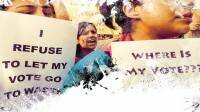The Higher Education Commission (HEC) has termed the recent budget allocations of the new government as a “breath of fresher air”, expressing it as a relief after the ‘turmoil’ undergone in the past five years.
Flashed in the debates, the HEC has been in political limelight for the past few years over the issues of recognising degrees of parliamentarians, political interventions for administrative control of the commission, budget allocations, and appointments.
Tremendous pressures and interventions in the affairs of the institution for the alleged political gains remained obvious in the past three years, hitting the credibility of the former political regime. However, the insiders of the commission, including some members, have politely been questioning the neutrality of the commission in different meetings. They observed some political activism on the part of the HEC’s top authority, which adversely affected the real job of the commission.
Former military ruler General (retd) Pervez Musharraf formed HEC in 2002, abolishing University Grants Commission, the national body giving financial grants to the varsities. The new HEC, a brainchild of a group of America-based expatriate educationists who influenced the regime, came up with a greater role in giving funds to the varsities and streamlining the public and private universities affairs in a uniform way.
Dr Atta-ur-Rehman, an established scientist in the field of chemistry, became founding chairman of the commission and served till the appointment of the sitting Chairman Dr Javaid R Laghari in mid-2009. He was very close to Mr Musharraf and there weren’t that much political intervention then because of this aligning with and trust of the ruling setup to independently promote higher education commission, internally and externally. However, there remained opposition of the HEC at political and academic level, terming it authoritative on the universities without proper internal accountability mechanisms.
The political side of the HEC actually started with the appointment of the sitting Chairman Dr Laghari, a close aide of assassinated chief of former ruling Pakistan Peoples Party, Benazir Bhutto. Previously, he was a Senator on the PPP ticket from 2006 to 2009. Dr Laghari, a prominent engineer and a PPP loyalist, also remained President of SZABIST (Shaheed Zulfikar Ali Bhutto Institute of Science & Technology) for an extraordinary period from 1995 to 2009 because of his loyalty, in addition to his professional capabilities and brilliance.
The gradually surfacing political and administrative differences between Karachi based Dr Laghari, who is recognised as a straightforward person, and President of Pakistan Asif Ali Zardari, who is also PPP co-chairperson and established reconciler, are known to all in the commission and close party ranks.
The non-compromising and inflexible attitude of the HEC top man started flaring up in 2010 with the issue of recognising educational degrees of elected parliamentarians, with the suspicions of many of them having fake ones.
Farooq Laghari, a bureaucrat, who is brother of the HEC chief, was arrested on the charge of corruption in mid-2010. He was released hours after the HEC chairman’s meeting with the Prime Minister Yousaf Raza Gilani. The sitting Prime Minister Nawaz Sharif, who was in the opposition at that time, publicly condemned this arrest terming it victimisation and putting pressure on HEC for political gains. His arrest was widely seen as a pressure tactic to tame HEC for confirmation of the education degrees of lawmakers. Later, the government also tried to appoint a bureaucrat and secretary level official as executive director of the commission to get hold of the issue.
Degrees’ recognition was a simple issue but the political activism of the commission affected its performance and the situation soon turned into a clash unfortunately. All this definitely had a political background, said a senior member of the commission, adding, the universities were vigorously pursued to quickly decide about the degrees of the parliamentarians, which was somehow unnecessary in the view of many within the commission. “It would not have happened if there was no political handling and political activism,” the member said.
“It was not a political manipulation but an effort to tell the commission to remain in its legal jurisdiction. The Supreme Court of Pakistan, in its verdict on the fake degrees of the parliamentarians, clearly directed the Election Commission of Pakistan (ECP) to verify the degrees of the parliamentarians,” said Sardar Aseff Ahmad Ali, who served as federal minister for education in the PPP-led cabinet of Yousaf Raza Gilani. He mentioned that it was ECP’s duty to come up with a final verdict and not of the education commission.
“Supporting the voice of PML-N parliamentarians, HEC started issuing decrees on the fake educational credentials of the elected representatives which was extra-constitutional,” he said, adding, “I am not supporting fake degrees but I am questioning the direct role opted by the commission to declare them fake.” He said there was strong resentment among the parliamentarians over this activism of the commission. “The problem with Pakistan is that the heads of the institutions start thinking themselves as kings. They do not hold themselves accountable. They try to control everything, even beyond their jurisdiction,” he observed. He called for transparency and accountability in making and taking decisions to save the institutions from monarchy and autocracy.
“There has been a continuous campaign against the HEC for the past few years including the plans to devolve the commission, cut its budget and influence it for political gains,” maintained Dr Atta, former chairman of the commission, while defending the HEC position. He said there were questions on the credibility of the educational credentials of around 200 parliamentarians. According to the HEC Ordinance 2002, the commission had all rights to verify the degrees, he added. He said the political clout was against this role of the commission. They wanted its administrative control to influence the HEC opinion. They also had eyes on the vast prime pieces of land of country’s public sector universities across the country which they wanted to grab and use for other commercial purposes. He said there were still attempts to bring the HEC under the political clout by damaging its autonomy and introducing a new ministry for raising the standard of higher education. “Corrupt politicians want to ruin the commission by compromising on budget, autonomy and standards of HEC.”
“I do not see it as political activism but struggle for survival while fighting for the rule of law and merit,” Dr Atta maintained. He said that even India was planning to follow the HEC model by abolishing its university grants commission and introducing a national higher education commission while in Pakistan politicians wanted to use it for their benefits and gains, which is unfortunate. He said solution to take these institutions out of such situation is to follow the law and merit, and respect the same.
The HEC members and many vice chancellors believe that for the past few years the role and status of the commission has been made controversial and insignificant by the politicians and the real job of the commission has been adversely affected since then. The tug of war between the HEC and the parliamentarians is continuously jeopardising the real job of the commission. There have been political pressures. However, there has been seen an uneven approach by the commission to sort out this issue. “Merit was different for different persons and sections, thus giving some political connotations,” said a vice chancellor of a Khyber Pakhtunkhwa university requesting not to be named. Rather than indulging in politics, the commission should focus on its main task of improving varsities’ standards and quality of higher education.
The HEC chief, in its recent public statement, has praised the new government. “HEC is pleased with the support provided by the new democratic government to higher education as per its commitment in the PML-N manifesto 2013,” reads an official statement of Dr Laghari soon after the federal budget announcement. “It is a like a breath of fresh air after the turmoil HEC and the higher education institutions have undergone in the last five years,” he added.
The new government has taken charge but it is yet to be seen how the HEC would get autonomy and keep itself away from the political interference at the moment when many politicians involved in the issue have joined the ruling PML-N camp.
The writer is a journalist based in Lahore.
























